Ziauddin Yousafzai: 'My dream for my daughter Malala'
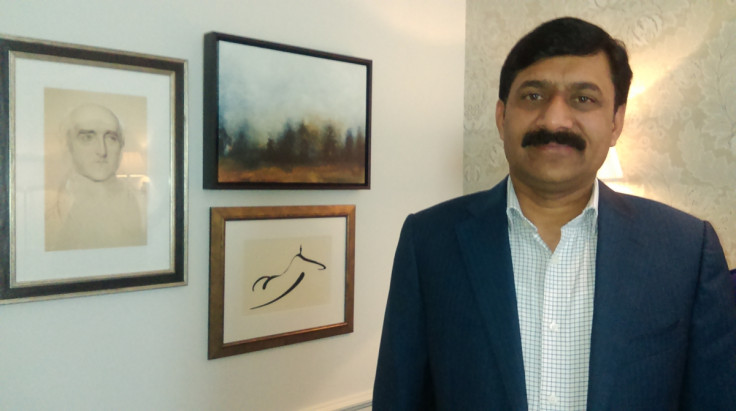
Ziauddin Yousafzai is better known these days as Malala's dad. A political activist in Pakistan himself, there is no doubting his nurturing influence is an intrinsic factor in the path his daughter has chosen, inspiring her passion for education.
He named her after the legendary 19<sup>th century Pashtun folk heroine Malalai of Maiwand, who was killed in battle for raising her voice against British tyranny, for being outspoken. "There was a real deep passion in my heart when I was naming my daughter after her that she will have a role. She will have a life. She will have a recognition. She will have an identity which Malala of Maiwand had," he says.
Her name, and her father, have played a part in shaping Malala's destiny. Like Malalai, she too was struck down for speaking her truth. As a 15-year-old - a child – she became a prime target for the Taliban. She was shot in the head for defending her right to an education. Her face is partially paralysed, her ear shattered, rendering her completely deaf in one ear. A charmingly lop-sided smile is the only visible evidence of her physical injuries. But the bullet of the Taliban was no match for her indomitable spirit, that is more resolute than ever.
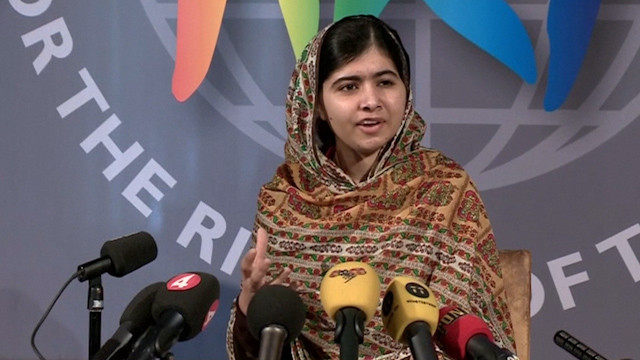
She survived the attack and today laughs in the face of ongoing threats to her life. She tells Oprah Winfrey "Why should I be afraid of the Taliban? They can't do anything to me. They tried to kill me, but they couldn't."
Today the name Malala is symbolic of the rights of all children and she is their voice. Her courage in speaking for the rights of children when she was just a child herself has won her endless epithets of which she is entirely worthy: a global icon, the youngest Nobel Peace Prize winner in history, a UN ambassador for children and a champion for the rights of children, who will not be silenced. But to Ziauddin, she is his daughter first.
In the moving documentary He Named Me Malala, by Oscar winning director Davis Guggenheim, her story is sensitively recounted by those who lived it with her: her father and mother who faced the reality of persecution, displacement and the unimaginable torment of seeing their only daughter suffer the brutality of a terrorist regime; and Malala herself, who in her capacity for forgiveness reveals the pure-hearted spirit of a child, who just wanted to go to school.
While the world celebrates Malala, who has made it her life's mission to ensure every child gets an education, Ziauddin Yousafzai reveals his own dream for his daughter, spoken from the heart of a father.
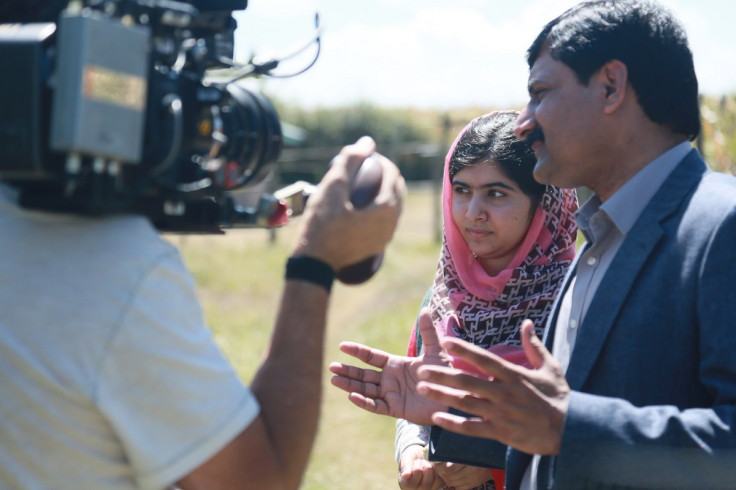
A teacher in Pakistan, he speaks eloquently, with the kind of grammatically precise English particular to those who are not native speakers, but who are evidently highly learned. There's humility in his words and he reveals all the traits of a man of great virtue as he speaks passionately about the rights of women. It's not difficult to see where his daughter gets both her wisdom and her humanity.
He explains that the documentary is very much intended to maximise on the global interest in Malala, entirely with the objective of furthering their cause. "We had this intention that if we tell our story, if we share our story of what we passed through, other people's experience can be understood. It's not the story of one family. It's the story of millions of people around the world who are suffering because of terrorism. It's the story of all refugees who have left their homelands because of these wars. We had been living as IDP's (Internally Displaced Persons) in Pakistan for three months. We didn't know where to go, where our children will live and eat. It was very difficult. This story tells not only our story, it tells the world the story of refugees and over 60 million girls who are not in school."
Guggenheim spent two years with the family, documenting the aftermath of the attack, Malala's rehabilitation and her illustrious reception on the world stage. Ziauddin describes the experience of making the documentary as a form of therapy as they processed the tragic events of the past. But three years on and the news footage of their daughter being carried into an ambulance, her school uniform covered in her blood, leaves her parents still a little broken. There is no escaping the enduring pain that comes of reliving the moment your daughter was stricken by a bullet in the head.
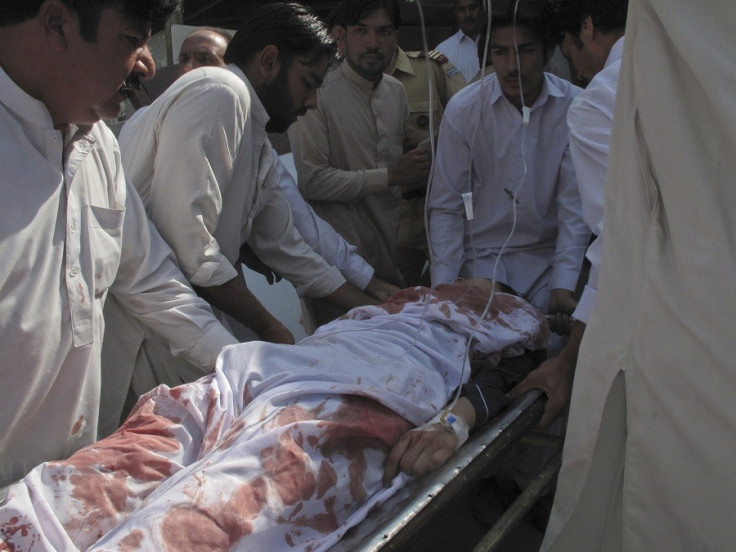
"Some of the footage is of Malala's attack and when we were in hospital, all the difficulties we faced. When we see those scenes my wife always cries and I have tears in my eyes, so it's still really difficult to watch some of the parts of the documentary," he explains, his voice softening at the still painful recollections of the attack. The deep hurt triggers his occasional stammer. The words are difficult to utter for a father who realises how close he was to losing his daughter.
Malala herself doesn't speak about the attack on her life by the Taliban. The memory of the trauma has apparently been repressed and steeped as she is in positivity, she has no intention of revisiting such a dark place.
I don't want to be known as a girl who was shot by the Talban. I want to be known as a girl who fought for her rights.
"She is very clear about it," explains Ziauddin. "One blessing in disguise is that when she was attacked and after she came into consciousness she doesn't know anything about the actual incident that happened to her. The two men coming onto the bus and asking who is Malala. After that she can't remember anything of it. And then later on when she went to speak at the UN, a day before, there was a reception for her in New York and she said something very important and I had tears in my eyes as I listened to her speak. She said: "I don't want to be known as a girl who was shot by the Talban. I want to be known as a girl who fought for her rights." This is the strength of her personality. That's why she says I have forgiven them. She has forgotten it and she has forgiven them."
Ziauddin describes his family's everyday life today: how they have adjusted to their new home in Birmingham so far from their home in Swat Valley, a former paradise desecrated by the Taliban. He reveals that his wife Toor, a traditional woman who once covered herself from head to toe, is now learning English at college and likes to go to the gym.
While the transition to a new life was difficult they have no misapprehensions about how lucky they are. "It was very difficult when we first came to the UK because it was culturally a different country. We miss our land, we miss our people, I miss my school. Malala misses her friends. It is hard, but we are trying to adjust.
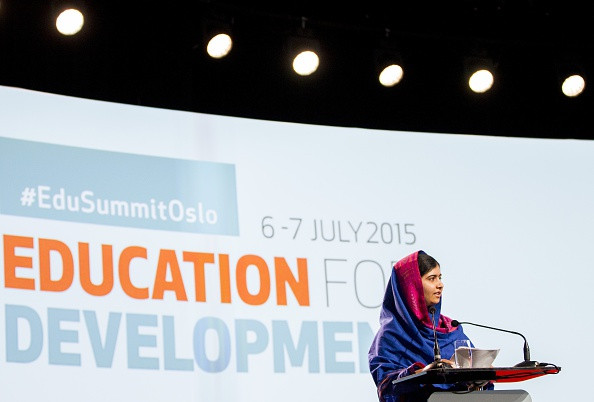
"But we look at the broader perspective of our new life, which has brought a great opportunity to leverage this campaign for global education and to bring every girl to school and to ask the world leaders and communities to focus on girls' education. In Pakistan 25 million children are out of school from age 5 to 16 and 13 million of them are girls. So if half of the whole population is paralysed and don't have access to school, how can we think that we can be a prosperous and peaceful nation. So with this we say "Ok we are out of our country, we have lost many things in life, like family, our kith and kin, our school in Pakistan, but we want to build on this opportunity for the world at large, for the children of the world."
He means every word. And neither he nor Malala will rest till it is achieved. Like all the best teachers who nurture a child to achieve their full potential, he believes that Malala's work is only just beginning. "I myself believe that this is not something that you achieve in life and it is done. Everyday you have to make an effort that you should be a good father and similarly my daughter has to be continuously struggling to achieve her aim of sending every boy and every girl to school. This is a journey which will end only when every child is in school receiving quality and safe education, especially girls."
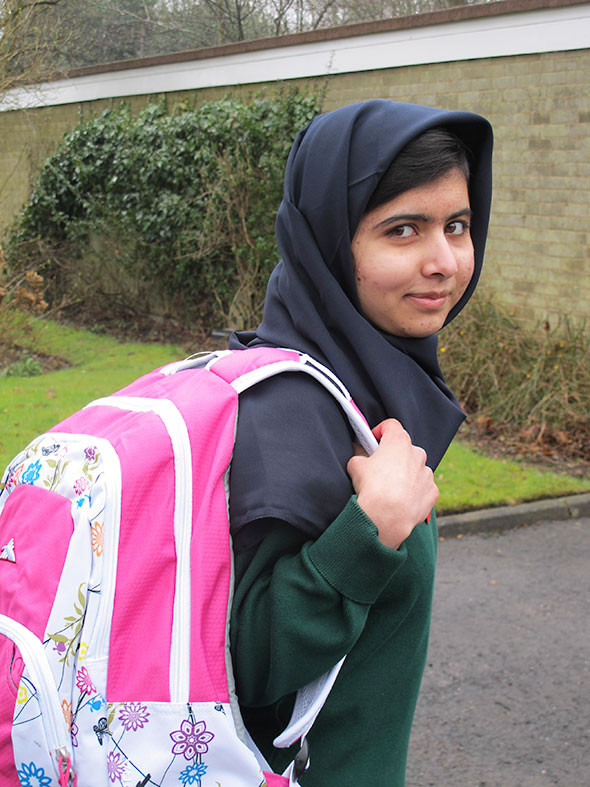
For Ziauddin, the activist and the UN Special Advisor on Global Education, the goal to achieve an education for all children is at the forefront of his mind. But for Ziauddin the father, watching the personal growth of his daughter, her particular quirks, her sense of humour and her evolving personality are an endless source of fascination and pride, as for any father watching their daughter grow to become a young woman.
Now 18 years old, the documentary reveals the very normal teenager that Malala is when she's not being a world leader. The Malala who likes pizza and Katy Perry, who shyly pores over pictures on the internet of teen crushes Roger Federer and Shahid Afridi, who shops with her friends in the malls and fights with her younger brothers. Yes, apart from that thing of being an inspiration to millions, she is a typical teen. It's a side to her that her father cherishes more than the global icon status afforded her.
"I become every happy [when I see her like this]. Because if somebody is always like an icon, or a symbol, its good for a cause, but its very important that you are a normal human being. That you have the same sentiment or feelings and instinct which normal human beings have. She is a normal girl. It also shows the world that you don't have to be abnormal to achieve your great mission in the world or your cause or to be iconic. You can be very normal with all your great agenda for the people."
And while she thought nothing of reprimanding President Goodluck Jonathon over his inaction over the missing girls kidnapped by Boko Haram, even a Nobel Peace Prize Laureate sometimes gets told off by her mother. "Yes, sometimes when her mother disagrees with her, she tells her why didn't you say your prayers, why is your room messy. This happens," her father admits.
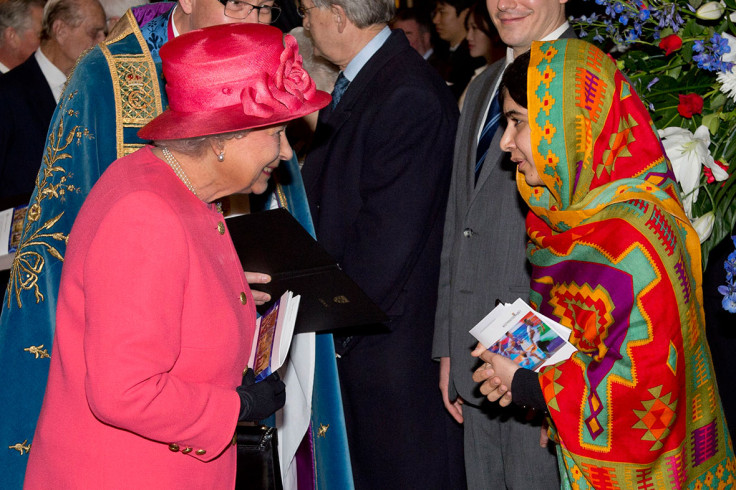
But of course her life is out of the ordinary. He recounts Malala's meeting with the Queen and her comical efforts at practising her curtsey. "Malala was told how she should bow or curtsey but she didn't know how. But the queen didn't mind. She was very kind so she didn't have to do that. The Queen was receiving many people and we were in a queue. But Malala was so precise in her message. After greeting she described herself and she told the queen what she stands for. And she just told her, education for girls is important. Malala made me proud on that day."
You can imagine that everyday of his life Ziauddin must be proud to have Malala as his daughter, whether she's acing her GCSE's, having an audience with a head of state or inspiring other children to achieve their goals. Political figureheads from President Obama and Ban Ki Moon have hailed this child warrior who has become a symbol of peace and equality. But she seems unaffected by the sheen of celebrity. Her friends had to tell her why meeting David Beckham was a big deal. Actually, meeting Malala was a far bigger deal for the former England captain, as it is for everyone.
"She herself tells that she learns from everybody if they are inspirational. She is inspired by everybody, not just world leaders or big names. When she meets children she says 'they ask me difficult questions.' So she is inspired by children and she was inspired by the Syrian refugee girls when we opened a school in Lebanon on her 18<sup>th birthday and the girls who were there. Their passion for education inspired us."
While the documentary is about a family's determination to speak out against tyranny, united in their goal to secure an education for all children, in the end it is the story of a father's unshakeable belief in his daughter that has empowered her to be a force for change in the world. Global icon, Nobel Laureate, occasionally errant teen- she is all these things, but she's still his little girl and Ziauddin doesn't dream about the day she will be Prime Minister of Pakistan. Like every father, he dreams of the day he will see his daughter married.
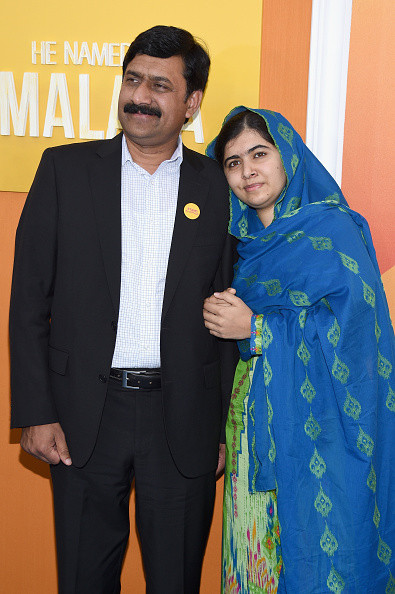
"I have the same dream as any normal father has. Yesterday we were sitting in the car and I told her, "I dream that one day after five years or ten years the seat I am sitting on there will be another guy, because you will have a life partner, a husband." And she jokes and teases me back in a very nice way. She says 'Abba (Father) it might happen soon.'
"Our father daughter relationship, it is of freedom and independence. When I see her more free in her thinking and more free in her independence I feel happy. A parent's dream should be the independence of the children. Love is to let someone free that they can fly, they can sail on the wind like a dove or soar like an eagle but let us not cut their wings. What did I do for Malala that was different from any other father? Nothing. I just didn't cut her wings."
Malala is an inspiration for millions, but I'm guessing if you asked her who is her greatest inspiration, she would tell you it's the man who named her - her father.
He Named Me Malala releases on November 6, 2015.
© Copyright IBTimes 2025. All rights reserved.






















